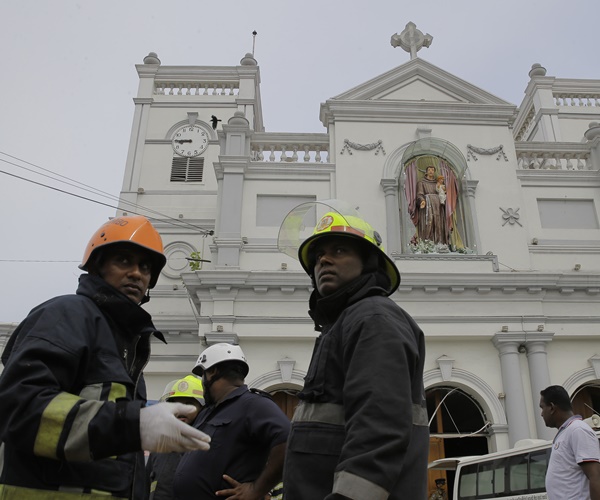Across Sri Lanka on Sunday morning, travelers and worshipers settled in at tables for Easter breakfast and into pews at churches on the country’s east and west coasts, where they had come to celebrate a holy resurrection.
Then the explosions began.
Between 8:45 a.m. and 9:30 a.m. on Sunday, in three cities, suicide bombers at three luxury hotels and three Christian churches detonated explosive devices. Five hours later, two more explosions were reported near the capital city of Colombo, one at a low-budget inn and the other at a residential housing complex.

At least 290 people died in the attacks, and more than 500 were injured — turning Christianity’s most joyous day to one of mass carnage. Sanctuaries were hit by shrapnel and left without roofs. Photos show blood-spattered walls, splintered wooden pews and bodies.
This is what we know so far about how the day unfolded.
8:45 a.m. to 9:30 a.m.
Inside St. Anthony’s Shrine, a tourist landmark in Colombo with the largest Roman Catholic congregation in Sri Lanka’s capital, dozens gathered Sunday morning to celebrate Easter. Just before 9 a.m., there was an explosion so violent that nearby buildings shook, witnesses said — prompting the first news reports on what would become a day of coordinated attacks.
N.A. Sumanapala, a shopkeeper near the church, ran inside to help and found a “river of blood,” he told the New York Times.
“Ash was falling like snow,” he said.
Twenty-five miles north, in the Catholic-majority town of Negombo, worshipers filled wooden pews inside the golden-tinged sanctuary at St. Sebastian Church. An explosion tore through the room there, too, blasted open the roof and shredded the seating. Shrapnel was embedded in the walls, and small statues of saints fell to the ground. Blood was everywhere.
St. Sebastian Church after the blast in Negombo. (Chamila Karunarathne/AP)
“A bomb [attack] to our church,” someone posted to the church’s Facebook page in the moments after the blast, attaching gruesome photos that show mangled bodies and bewildered witnesses. “[Please] come and help if your family members are there.”
The blast in Negombo killed more than 100 people and injured as many.
Just after 10 a.m., the Associated Press reported the first two explosions but immediately followed with a devastating update: At the same time St. Anthony’s and St. Sebastian were being attacked, explosions had rocked three Colombo hotels and another church on Sri Lanka’s east coast.
The explosions, officials said, appeared to be coordinated — and the Colombo structures were hit hardest.
The attackers targeted restaurants in four-star hotels, where tourists were gathered for Easter breakfast. At the Cinnamon Grand Hotel, a manager told Agence France-Presse that a suicide bomber stood in line for the breakfast buffet before detonating the explosives attached to his body. The manager, who spoke on the condition of anonymity over safety concerns, told AFP that Taprobane, the hotel’s ground-floor restaurant, was packed with families. The blast set off “utter chaos,” the manager said.
Guests throughout the hotel heard and felt the explosion. Julian Emmanuel, a doctor in the United Kingdom, told the BBC the room he was staying in with his wife and children “rocked.” They evacuated and were ushered through the back door, where they saw the damage and passed the bodies.
Sri Lankan soldiers secure the area around St. Anthony’s Shrine. (Eranga Jayawardena/AP)
Two explosions about 10 seconds apart gutted a second-floor restaurant at Shangri-La, blowing out the ceiling and windows and exposing wires. Witnesses said all they could hear was screaming.
“Everyone just started to panic; it was total chaos,” Kieran Arasaratnam, a professor at Imperial College London Business School who was staying in the hotel, told the BBC. “Everyone was running and a lot of people just don’t know what was going on. People had blood on their shirt, and there was someone carrying a girl to the ambulance. The walls and the floor were covered in blood.”
Authorities moved between overturned tables to inspect the bodies strewn there, some of them tucked beneath white sheets, reported ABC Australia.
A third hotel, the Kingsbury, also was attacked in the same time frame.
Across the country in Batticaloa, evangelical worshipers at Zion Church were the only victims on the east coast in the attacks. A witness told the BBC he heard a “big bang” while cycling and saw “smoke billowing into the sky about half a mile away.”
The initial chaos of the six blasts made way for swift condemnations from world leaders and a near shutdown of the country.
Officials called in all available law enforcement and health-care workers in the affected cities. University classes were canceled indefinitely, and the government told schoolchildren to stay home Monday and Tuesday. Extra security descended upon the Bandaranaike International Airport, and the government shut down access to social media.
In the Colombo district, Catholic officials canceled all Easter masses. In Vatican City, Pope Francis condemned “such cruel violence.”
On Sunday afternoon, hours after the six blasts, government officials announced a curfew would go into effect at 6 p.m. — but they were forced to implement it earlier than that.

Around 2 p.m.
Five hours after the six initial explosions, another blast was reported at the low-budget Tropical Inn, located near the national zoo in Dehiwala, south of Colombo. A witness told local TV he saw severed limbs there, according to reporting from Reuters and ABC Australia.
Another witness told CNN he heard the explosion and saw helicopters fly overhead.
Around 2:45 p.m.
Authorities received a tip that potential suspects were inside a safe house at a residential complex in Dematagoda, on the outskirts of Colombo. Shortly after the officers entered the home, an eighth blast went off, the Associated Press reported. Several officers were killed.
After the last two explosions, authorities instituted the curfew early. Residents retreated inside, and tourists were forced to stay where they were and forbidden from leaving the island.
“There’s nothing. No vehicles, no people walking, nothing,” Simon Whitmarsh, a retired doctor on holiday in Batticaloa, told the BBC. “ ‘Stay indoors’ is the message.”


Is sadly & deadly over sea those Christians ! those human animals , we need to treading as hunting machine kills than much possible . so as US ! we have to find out laminates the Radicalization group’s or individual much we can , which’s Obama didn’t do . start from restricted legals & blocks illegals entry , For those who’s not follow the rules & laws also particularly for those been accepted to comes have to go through our history regulations well for specially younger persons , make sure they’re understand the ways our culture & society in this country’s before we let them in , certainly not for
illegals terms at all !!
this is horrific, no church is safe anymore, radical Islams and anyone else need to realize that this kind of sickness will not take us away from our Christianity.